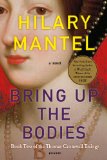Summary | Excerpt | Reading Guide | Reviews | Beyond the Book | Readalikes | Genres & Themes | Author Bio

Critics' Opinion:
Readers' Opinion:
First Published:
May 2012, 432 pages
Paperback:
May 2013, 432 pages
Back in London, the Emperor's ambassador, Eustache Chapuys, waits daily for news that the people of England have risen against their cruel and ungodly king. It is news that he dearly wishes to hear, and he would spend labour and hard cash to make it come true. His master, the Emperor Charles, is lord of the Low Countries as well as Spain and her lands beyond the seas; Charles is rich and, from time to time, he is angry that Henry Tudor has dared to set aside his aunt, Katherine, to marry a woman whom the people on the streets call a goggle-eyed whore. Chapuys is exhorting his master in urgent dispatches to invade England, to join with the realm's rebels, pretenders and malcontents, and to conquer this unholy island where the king by an act of Parliament has settled his own divorce and declared himself God. The Pope does not take it kindly, that he is laughed at in England and called mere 'Bishop of Rome', that his revenues are cut off and channelled into Henry's coffers. A bull of excommunication, drawn up but not yet promulgated, hovers over Henry, making him an outcast among the Christian kings of Europe: who are invited, indeed, encouraged, to step across the Narrow Sea or the Scots border, and help themselves to anything that's his. Perhaps the Emperor will come. Perhaps the King of France will come. Perhaps they will come together. It would be pleasant to say we are ready for them, but the reality is otherwise. In the case of an armed incursion we may have to dig up the giants' bones to knock them around the head with, as we are short of ordnance, short of powder, short of steel. This is not Thomas Cromwell's fault; as Chapuys says, grimacing, Henry's kingdom would be in better order if Cromwell had been put in charge five years ago.
If you would defend England, and he would – for he would take the field himself, his sword in his hand – you must know what England is. In the August heat, he has stood bare-headed by the carved tombs of ancestors, men armoured cap à pie in plate and chain links, their gauntleted hands joined and perched stiffly on their surcoats, their mailed feet resting on stone lions, griffins, greyhounds: stone men, steel men, their soft wives encased beside them like snails in their shells. We think time cannot touch the dead, but it touches their monuments, leaving them snub-nosed and stub-fingered from the accidents and attrition of time. A tiny dismembered foot (as of a kneeling cherub) emerges from a swathe of drapery; the tip of a severed thumb lies on a carved cushion. 'We must get our forefathers mended next year,' the lords of the western counties say: but their shields and supporters, their achievements and bearings, are kept always paint-fresh, and in talk they embellish the deeds of their ancestors, who they were and what they held: the arms my forefather bore at Agincourt, the cup my forefather was given by John of Gaunt his own hand. If in the late wars of York and Lancaster, their fathers and grandfathers picked the wrong side, they keep quiet about it. A generation on, lapses must be forgiven, reputations remade; otherwise England cannot go forward, she will keep spiralling backwards into the dirty past.
He has no ancestors, of course: not the kind you'd boast about. There was once a noble family called Cromwell, and when he came up in the king's service the heralds had urged him for the sake of appearances to adopt their coat of arms; but I am none of theirs, he had said politely, and I do not want their achievements. He had run away from his father's fists when he was no older than fifteen; crossed the Channel, taken service in the French king's army. He had been fighting since he could walk; and if you're going to fight, why not be paid for it? There are more lucrative trades than soldiering, and he found them. So he decided not to hurry home.
And now, when his titled hosts want advice on the placement of a fountain, or a group of the Three Graces dancing, the king tells them, Cromwell here is your man; Cromwell, he has seen how they do things in Italy, and what will do for them will do for Wiltshire. Sometimes the king departs a place with just his riding household, the queen left behind with her ladies and musicians, as Henry and his favoured few hunt hard across the country. And that is how they come to Wolf Hall, where old Sir John Seymour is waiting to welcome them, in the midst of his flourishing family.
Copyright © 2012 by Hilary Mantel




Silent gratitude isn't much use to anyone
Click Here to find out who said this, as well as discovering other famous literary quotes!
Your guide toexceptional books
BookBrowse seeks out and recommends the best in contemporary fiction and nonfiction—books that not only engage and entertain but also deepen our understanding of ourselves and the world around us.